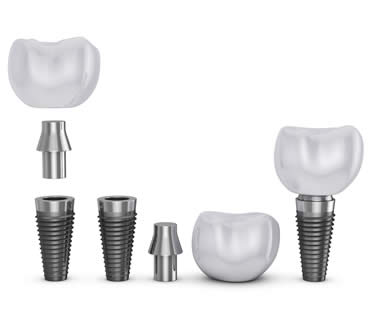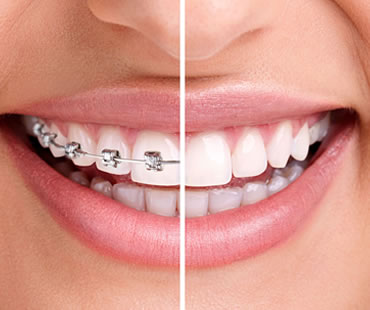
Your family dentist knows that your child’s pacifier serves an important purpose. It soothes and comforts your child during difficult or stressful events. During the time of infancy, pacifiers are common and valued. Extended use of the pacifier during the development of the teeth, however, can lead to unwanted changes to your toddler’s mouth.
Sucking too hard on a pacifier, just like sucking too long on fingers or a thumb, can have serious consequences to a child’s teeth and even to the shape of the child’s face. Your family dentist will tell you that you should take away your child’s pacifier by the age of two years, preferably by the end of the first year. Failure to stop the use of a pacifier can lead to extended orthodontic care in the future.
Your family dentist can show you research that indicates that pacifier use beyond the second year is linked with crossbites, open bites, misaligned bites, a narrowed jaw, tongue thrust and malformed palate. It is also associated with an increased risk of a middle ear infection.
If your infant is using a pacifier, follow these guidelines:
- Clean the pacifiers regularly and properly to prevent bacterial growth.
- Discard and replace pacifiers that exhibit any signs of discoloration or cracking.
- Clean any new pacifiers prior to giving them to your baby.
- Make pacifiers available only during specific times, such as at naptime or bedtime.
- Purchase pacifiers specifically recommended by orthodontists for minimal damage to the mouth.
- Never allow your baby to “wear” the pacifier by tying it around his or her neck. This is dangerous. Pacifier clips can allow you to clip the pacifier to your baby’s clothing with a short, safe length of material.
Your family dentist will have important tips for you when you begin to wean your child away from pacifiers. Don’t let this habit extend beyond being useful to becoming harmful.
Schedule your appointment at our Meriden dental office

Dental implants are artificial teeth that mimic your natural tooth roots and are placed directly into your jawbone to provide optimal support for dental crowns, bridges and removable prosthodontics such as dentures. If you are considering dental implant therapy, please use the following guide to answer some of your questions.
- Am I a candidate for dental implant treatment? Dental implants can be used in healthy patients whose jawbones have completed growing and who have sufficient quality and quantity of jawbone to have a healthy implantation.
- Is dental implant treatment safe? Dentists agree that in healthy patients who are good candidates for the procedure, dental implants are low-risk.
- Will I be in a lot of pain during dental implant surgery? Dental implant surgery is typically performed as an outpatient procedure in your dentist’s office under local anesthesia.
- Does it take a long time to undergo the procedure? Treatment can generally be performed in under an hour, depending on the number of implants required.
- Is recovery painful? Healing from dental implant surgery is typically quick and easy for most healthy people. Any lingering pain can be treated with over-the-counter pain relievers.
- When will I get my new teeth? Implants must fuse to the bone in a process called ossification, a process that can take up to six months. In most cases, temporary teeth will be in place during this time period.
- How do I care for my dental implants? You will take care of your implants in the same way you would care for your natural teeth. Brush twice a day or after meals, especially before bedtime. Floss daily and continue to maintain regular dental appointments for checkups and preventative care.
- How long do dental implants last? Dental implants can last for twenty or thirty years if you care for them properly.
Our dental office is located in Meriden

Whether you call it pop, soda, soft drink, or something else, these terms all refer to a sugary, carbonated drink popular all over the country. It is estimated that Americans consume over 13 billion gallons of soft drinks each year. These beverages can cause serious health problems, including negative effects on your oral health.
Soft drinks are one of the most significant reasons for tooth decay, and it impacts all age groups. From babies drinking it out of bottles to teenagers drinking it all day long to older adults sipping it in retirement homes, it is deteriorating tooth enamel and eroding gums of everyone who consumes it.
Why are soft drinks harmful?
The high sugar content in the drinks is the root cause of trouble, and the high acid content adds to the threat. The sugar combines with bacteria in your mouth to create an acid, which adds to the acid from the drink itself. Then this mixture attacks your teeth. Each time you take a drink of the carbonated beverage, an acid attack begins in your mouth. During this time, your tooth enamel is weakened and cavities are just waiting to form. You may think that the risk goes away by drinking sugar-free soft drinks. Although these are less harmful, they are still acidic and can lead to decay.
How can I avoid harming my teeth?
The ideal way to rule out risks from soft drinks is to cut them out of your diet completely. If you think you just can’t live without them, here are some suggestions:
- Substitute other drinks. Try drinks with less sugar, like 100% fruit juice and milk.
- Set a good example. Drink alternatives yourself and encourage your kids to do the same.
- Sip with straws. This helps keep the sugar from direct contact with your teeth.
- Rinse with water. After drinking a soda, rinse your mouth with water to reduce the amount of sugar and acid hanging onto your teeth and gums.
- Use fluoride toothpaste and mouth rinse. Using fluoride in your daily dental routine helps to reduce decay and strengthen enamel. Also ask your dentist about the possible need for professional fluoride treatments.
If you need a dentist in Meriden contact us today

Pain, sensitivity, and trouble eating or sleeping are only a few of the uncomfortable symptoms of a damaged tooth. Sometimes the inside portion of a tooth, or its pulp, becomes so damaged that action must be taken. It could come in the form of extracting the tooth or it might be able to be saved through root canal treatment.
Virtually every dentist recommends root canal therapy over tooth extraction. It’s almost always better to save your natural tooth. Otherwise, you’ll end up with a hole in your smile and the problems that accompany it.
A tooth can be damaged for a variety of reasons such as severe decay, trauma, or deep cavities. The damaged pulp contains nerves, which is one reason that many patients experience severe pain. Although dental fillings can remedy some cavities or decay, when the situation advances to the extent of harming the tooth pulp, fillings are not enough. Root canal treatment is usually the best way to repair the tooth without having to pull it.
A root canal procedure involves drilling into the tooth so that the pulp can be completely removed and the canal thoroughly cleaned. Then the area is filled with special material and sealed to prevent future damage. Often, a dental crown is placed on top of the restored tooth to provide added protection. This process alleviates any symptoms and give you back your fully functional, natural tooth.
If you were to opt for tooth extraction instead of root canal treatment, you’d be choosing a more invasive approach. The procedure can be intrusive, time consuming and costly. Recovery from tooth extraction can be uncomfortable and take longer than root canal therapy. Careful oral hygiene is necessary after extraction to avoid infection or complications. You’ll also be left with an unappealing hole in your smile that can make eating and speaking more difficult, and your other teeth will likely start moving into that empty space.
To determine the best treatment for you, consult a reputable dentist. You’ll learn about the options and how root canal therapy may be the best choice in restoring your oral health and your smile.
We look forward to seeing you in our Meriden dental office

Pregnancy is an exciting time in your life that brings about many changes to your body. Your oral health is affected as well. There are specific things to keep in mind during pregnancy related to your teeth, gums, and caring for them. Let’s talk about the things you should be thinking about for your mouth while expecting a baby.
Medications:
Tell your dentist about any prescription or over-the-counter medicines you’re taking, so that it’ll be easier to prescribe any drugs needed for you during dental treatment. Your dentist may also want to consult your doctor to discuss safe painkiller or antibiotic options for you during pregnancy.
X-Rays:
If you have a dental emergency or a problem that needs diagnosis, an X-ray may be required. Radiation exposure from dental X-rays is very low, but your dentist will cover you with a leaded apron to protect your abdomen. A leaded thyroid collar will also be used to protect your thyroid from radiation.
Gingivitis:
It’s not uncommon for some women to develop pregnancy gingivitis, which is a gum problem that occurs during the hormonal fluctuations of pregnancy. This condition is an inflammation of the gums that causes tenderness, swelling, and usually some bleeding during dental hygiene tasks. Your dentist may suggest more frequent cleanings during pregnancy to prevent gingivitis, because left untreated it can advance to more serious gum disease.
Pregnancy tumors:
Some pregnant women experience overgrowths of tissue called pregnancy tumors, which appear on the gums mostly during the second trimester. They are not cancerous and are usually located between your teeth. Dentists believe they are related to having too much plaque. Pregnancy tumors bleed easily and appear red and raw. Usually they go away after the baby’s birth, but some women prefer to have them removed before then. Discuss options with your dentist to see what’s best for you.
If you live in the Meriden area contact us today

Nearly two million people worldwide have discovered Invisalign, the latest technology for improving smiles. Treatment involves wearing a series of customized clear plastic aligners to gently shift teeth into better positions. This revolutionary method is appealing to patients because it eliminates some of the aspects that people dislike about traditional orthodontic solutions.
Perhaps the most obvious benefit to Invisalign is that the aligners are invisible. The clear plastic makes the trays almost undetectable in your smile. This gives patients the confidence to smile throughout treatment instead of being embarrassed by a mouth full of metal.
You can remove your Invisalign aligners at any time. Although for best success they should be worn at least 20 hours per day, they should be removed while eating or performing oral hygiene tasks. This means that there are no diet restrictions during treatment, and maintenance is simple because it involves normal brushing and flossing.
Invisalign aligners are comfortable since there are no wires or brackets that might poke or tear your skin. They also are safer than some other orthodontic options when playing sports or other activities. Invisalign aligners gently move teeth so there is typically less pressure or pain during treatment than with traditional braces.
The aligners are customized for every patient to treat your specific issues. Different sets of aligners are provided for adults, adolescents and children, plus different sets are worn during each stage of straightening. This personalized solution means that treatment is very precise, and it is even created and monitored using special computer software to increase the accuracy of treatment. Also, many patients find that the duration of treatment is less for Invisalign. The average treatment time is often about one year, as long as you wear the aligners as recommended.
With all of the advantages that Invisalign offers, it’s easy to understand why it has become such a popular choice in orthodontic treatment. If you’re interested in seeing if Invisalign is right for you, schedule a consultation with a dental professional who is trained and qualified in providing this type of treatment.
If you live in the Meriden area contact us today














